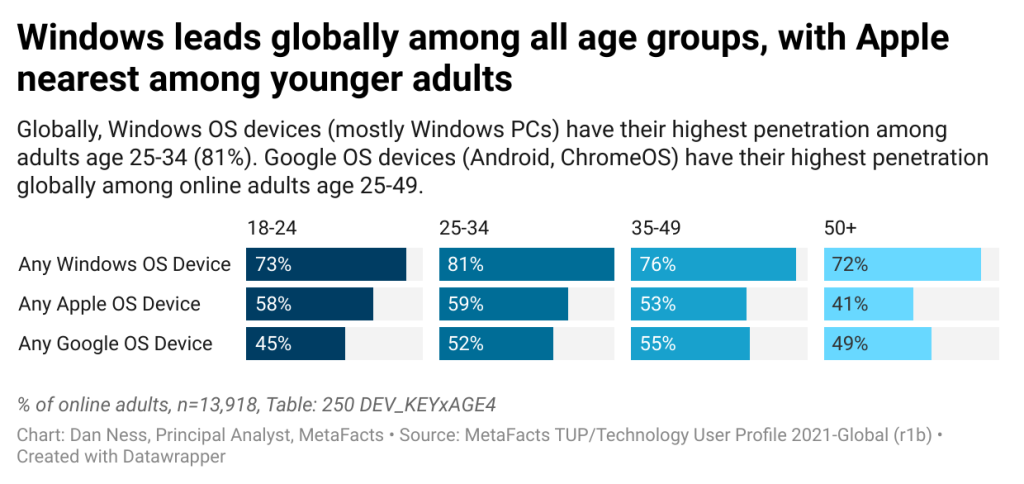Tablets continue to seek a solid home, major use cases, and most vital segments. Currently, the largest groups of users are passive, older, or entrenched in the Apple or Google ecosystem. While Apple continues to lead and increase its share, other makers like Samsung are seeing withering penetration. Incidental and passive activities from web browsing, shopping, movie-watching, and checking email haven’t been unique enough on tablets to entice users away from their smartphones or computers.
This TUP Highlights report includes the following sections: the profile of tablet users, trends in tablets, top tablet brands, top tablet activities, unique tablet activities, and trends in technology ecosystems.
Highlights: Mobile Phones
This TUP Highlights Report profiles smartphones – their market penetration, user demographic profile, their regular activities, usage profile, key competitors, and purchase plans.
Profile of Americans using Apple computers
One in five (22%) online Americans regularly use an Apple computer. They skew younger than the average online American. This MetaFAQs profiles users of Apple computers by several critical demographic and behavioral factors distinctive from the average American online adult: age, age within gender, life stage, number of home PCs, and technology ecosystems.
Users of multiple home and work Apple devices
What people actively use defines their brand loyalty and the depth of an ecosystem’s penetration. This TUP analysis looks at how many adults use an Apple OS device (iPhone, iPad, Mac) split by those who acquired them personally for home use compared to those who also use one that is employer-provided.
Highlights: Devices
There has been a sea change in which connected devices people use as well as how they use them. This TUP Highlights report details the trends in device ownership, the shifts between technology ecosystems, and market penetration levels. It spells out the major activities for each type of device, and how usage has changed. Furthermore, it details how many employees use personal devices for remote work.
Trends in technology ecosystems
Among online Americans, Smartphones have reached the same penetration rate as PCs, partly due to some segments where PC usage has declined. Apple has propelled much of this growth, outpacing Android smartphones in nearly every segment. Windows PCs, while still dominant, have been gradually losing their lead and penetration rates among most segments. Usage of tablets has continued its slow decline, primarily due to lowered market penetration of iPads within most market segments.
Purchase plans for smartphones and tablets by OS, country, and age
Globally, more online adults plan to buy an iPhone than buy an Android smartphone. In purchase plans, iPads lead Android tablets even more substantially. The gap and direction vary by country and age of the respondent. This MetaFAQs reports purchase plans among online adults by device type, country, and age group.
User activities reveal ecosystem strengths
While some may argue that a smartphone is a smartphone regardless of its ecosystem, users beg to differ, as shown by their actions. This MetaFAQs profiles activity usage differences between iPhones and Android smartphones, Windows PCs, Apple Macs, and Chromebooks, and iPads, Android, and Windows tablets.
Mobile Phones TUP Lens
Smartphones have rapidly, although not completely, replaced feature phones. Smartphone users have expanded their range of activities with new uses while also increasingly migrating activities from computers and tablets. This TUP Highlights Report profiles smartphones – their market penetration, user demographic profile, regular activities, usage profile, key competitors, and purchase plans.
This TUP Highlights report includes the following sections: penetration of smartphones versus feature phones, smartphone brand share, top activities for smartphones, smartphone carrier share, smartphone usage profile, trends in technology ecosystems, major activities for a market segment, and the profile of smartphone users.
User profile by operating system ecosystem
Dan Ness, Principal Analyst, MetaFacts, October 13, 2021
Apple for youngest adults and Windows for the middle
- Windows has the broadest overall market penetration of any OS family
- Globally, Windows is strongest among adults who are employed, in larger households, working from home, and neither the oldest nor youngest
- Apple OS devices have their strongest market penetration among younger adults, especially those employed and working from home
- Apple’s global market penetration is supported in three ways: iPhones, Macs, and iPads
- The global penetration of Google OS devices is primarily supported by Android smartphones.


